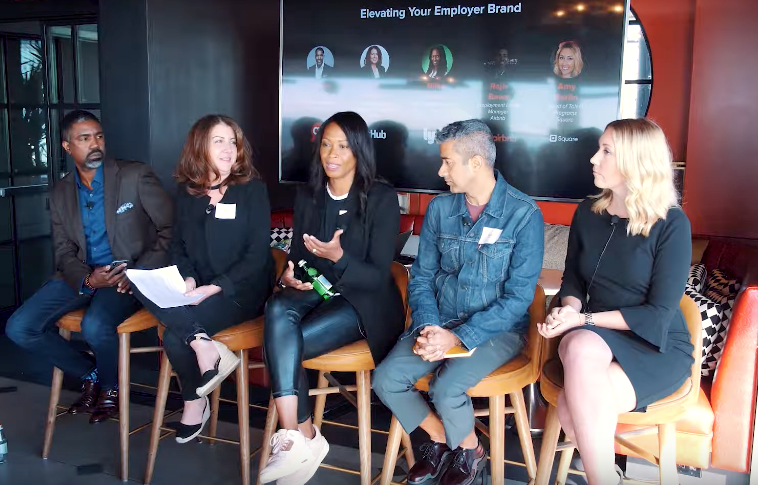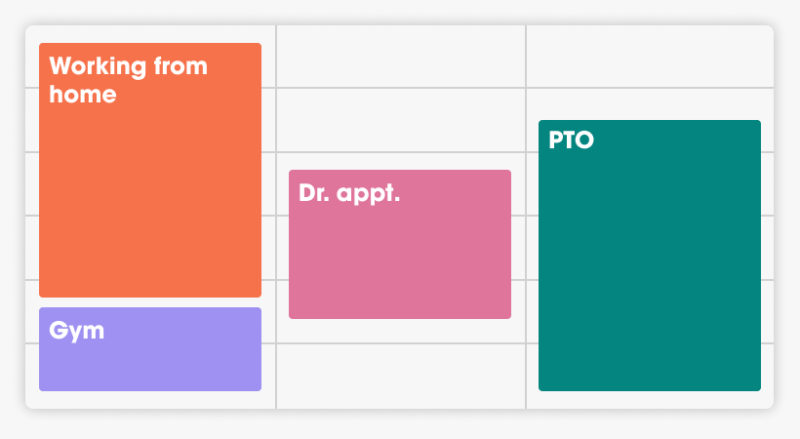
Why a Leaky Feedback Loop Could be Sabotaging Your Employer Brand: Lessons from Airbnb, Lyft, Kickstarter +
Hired recently released their annual Global Brand Health Report, a deep dive into which companies tech talent want to work for across 14 major tech hubs, and why. The data from more than 3,800 top tech workers on the platform provides valuable insights into how companies can compete for the best candidates – at a time when competition for tech talent has never been fiercer.
Related Update: Hired’s 2022 List of Top Employers Winning Tech Talent
To further unpack how companies can attract the best and brightest, I moderated a series of panel discussions hosted by Hired, with experts from the top-ranked brands from the report. I spoke with employer brand thought leaders from Airbnb, Lyft, Kickstarter, Github, Wayfair, and more in San Francisco, Toronto, Boston, New York, and Seattle (full list of expert panelists below).
Hired and I are very excited to share some of the key takeaways from our conversations to help you and your team elevate your employer branding strategy:
Defining your employer brandYour company’s employer brand or employee value proposition (EVP), is your promise to candidates and employees alike — and can be a powerful differentiator. Put simply, Andrew Blancato, VP of People at Kickstarter, believes “employer brand is the perception of what it’s like to work at a company.”
Related Success Stories: See how Chase, Bark, and Wayfair Used Hired Events to Amplify their Employer Brand
While the majority of the panelists I spoke with believe that talent teams should drive employer brand initiatives, all agree that it should be a collaborative process. Amy Berlin, Head of Talent Programs at Square, worked closely with the company’s marketing team to define their employee value proposition to ensure it “nestles under the overall company’s brand.”
Similarly, Nilka Thomas, VP of Talent & Inclusion at Lyft, saw the marketing team as a partner to ensure that Lyft’s driver brand, consumer brand, and employer brand were “all readily connected.”
Above all, Andrew Levey, Talent Acquisition Manager Technology Solutions at TD Bank, believes an employer brand should be transparent and authentic to ensure companies and candidates are meeting in the middle to accurately assess one another.
Measuring and monitoring successDuring Hired’s panel discussions, I also asked panelists to share how they measure the success of their employer branding initiatives. A common thread throughout the discussion was the importance of feedback loops. Specifically, Nilka makes use of Lyft’s candidate experience surveys to gauge her team’s effectiveness during the hiring process and identify opportunities for growth.
At Square, Amy shared that follower growth on Linkedin is a helpful performance indicator for an employer brand campaign. Her team sets follower growth goals for each campaign and leverages competitor follower growth to benchmark the team’s efforts.
Focus on what matters to tech candidatesThere is no shortage of flashy perks and benefits among innovative companies looking to attract top talent, but what truly motivates a candidate to work at a company? Hired’s 2019 Brand Health Report reveals that compensation takes the cake, followed closely by company culture and the opportunity to learn new skills. I asked our panelists which benefits and perks move the needle for their employees and hiring team:
- Gia Colosi, Head of Employee Engagement & Services at GitHub, shared that her team is embracing flexible and remote work options; 52% of the company works remotely — and for good reason. Our research shows that 65% of tech talent are open to working completely remotely.
- Rajiv Bawa, Employment Brand Manager at Airbnb, reported that the company leads with “No Meeting Wednesdays”, which has resonated with employees and candidates alike. The company also gives employees quarterly Airbnb credits to use towards stays and experiences on the platform.
- Lyft’s employee development team has tapped into this appetite to learn new skills by offering tuition reimbursement and launching an “exploreship” program that allows employees to rotate cross-functionally to learn new skills.
Your employer brand can make or break your company’s hiring and retention efforts. It is my hope that my conversations with the various leaders throughout this event series — paired with data insights from Hired — will empower companies to put their best foot forward and win over the best tech talent!
Interested in attending a panel discussion or hosting a coding challenge? See what’s coming up next in Hired Events!
A huge thank you to all of our expert panelists for sharing their valuable insights:
Boston:
Shaun Lee, Manager Global Employer Branding, Wayfair
Steven Scott, Director, Global Employer Branding, Akamai
Sophie Hamersley, Manager, Culture PR and Communications, HubSpot
Eric Richmond, Senior Director, Talent Acquisition, Car Gurus
Adam Devos, Associate Director, Talent Acquisition, Chewy
New York:
Andrew Blancato, VP, People, Kickstarter
Anne Hurley, Talent Branding Manager, NBCUniversal
San Francisco:
Rajiv Bawa, Employment Brand Manager at Airbnb
Nilka Thomas, VP of Talent & Inclusion at Lyft
Gia Colosi, Head of Employee Engagement & Services at GitHub
Amy Berlin, Head of Talent Programs at Square
Seattle:
Crystal Tomczyk, Senior Director of Centralized Recruiting, Recruiting Programs, & People Operations, Zillow Group
Gretchen Garland, Senior Communications Manager, Microsoft Life, Microsoft
Toronto:
Margaret Cichosz, Team Lead Recruitment, Thomson Reuters
Lyndsey French, Senior Manager, Talent Acquisition & Strategy, Loblaw Digital
Tanya Woit, Director, Talent & Operations, Think Research
Chelsea Howard, Director, Talent Strategies, Talent and Leadership, CIBC
Andrew Levey, Talent Acquisition Manager, Technology Solutions, TD Bank
Revised 4/20/23
Related blog posts

Navigating Market Uncertainty: The State of Tech Hiring (VIDEO)
Watch this webinar-on-demand to hear in-depth analyses of the hiring market today, based on...

Raise the Bar in 2023: Strategies from Top Employers Winning Tech Talent (VIDEO)
Need insight to plan your recruiting and hiring strategies for 2023? Watch this on-demand...

Re-engineering Your 2023 Tech Hiring Strategy (Watch VIDEO on Demand)
If you are in the market to hire qualified software engineers, you need to modify your 2023...

2023 Survey Results: Top 3 Benefits Ranked by Engineers (Besides Salary)
From layoffs, hiring freezes, inflation, and the explosion of AI, we’ve seen significant shifts in...

Cost of Vacancy: Making the Case for Hiring During a Downturn
Why the cost of job vacancy matters (and how to reduce it) As a recruiter, it’s up to...

8 Ways to Hire Faster & Build a Better Employer Brand
What You’ll Learn How to fill positions more efficiently through tools, templates, and...


